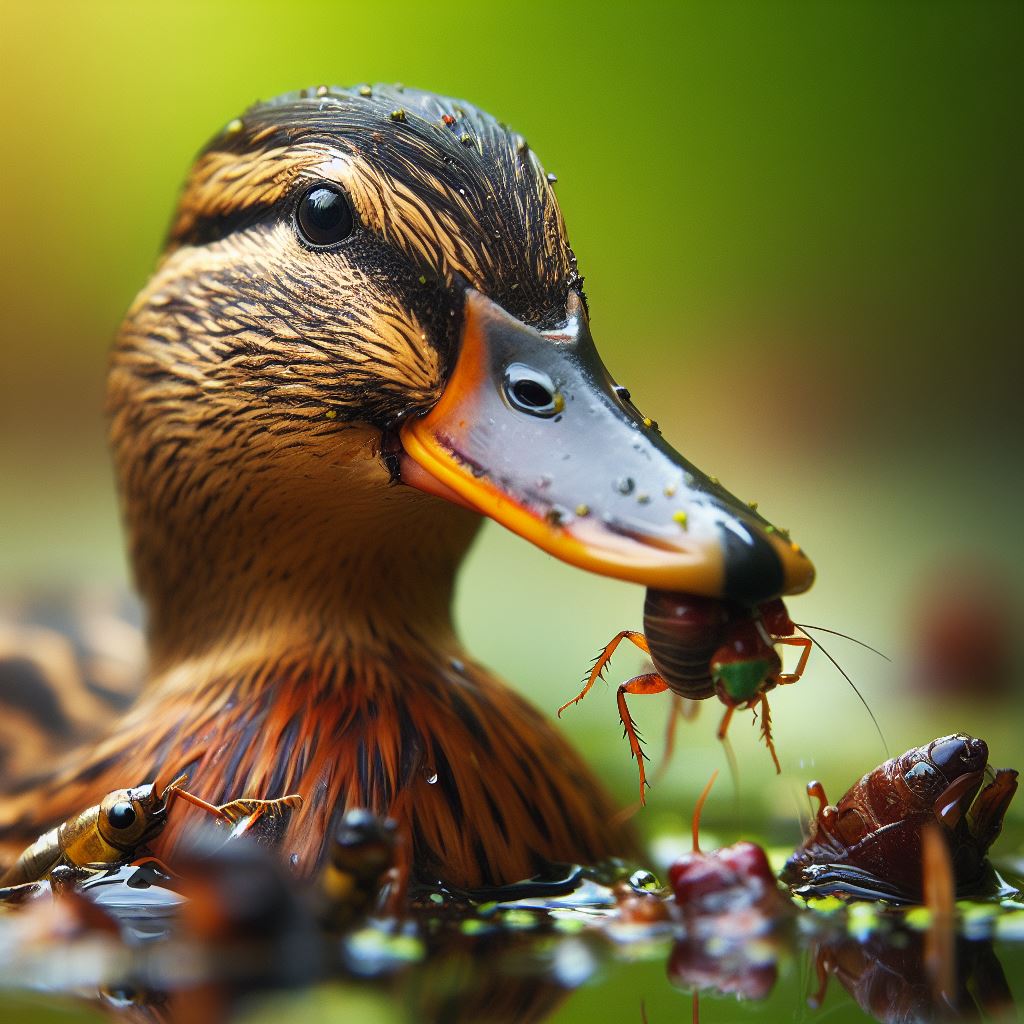Yes, ducks do eat crickets.
I can confirm that crickets make a nutritious supplement to a duck’s diet.
Crickets are packed with protein, vitamins, minerals, and other nutrients that support a duck’s health.
In the wild, ducks eat a diverse combination of plants, seeds, and small animals such as insects to meet their nutritional needs.
Similarly, domestic ducks benefit from variety in their feed.
While commercial duck feed provides a solid nutritional base, additions like crickets, mealworms, greens, and treats can round out the diet.
I recommend offering crickets to ducks in moderation as a supplemental protein source one or two times per week.
Scatter them in the ducks’ outdoor enclosure and let them hunt for the tasty, crunchy bugs.
This allows the ducks to exhibit their natural foraging behaviors.
Monitor to ensure ducks of all ages can safely eat the properly-sized crickets.
For more specifics on incorporating crickets and other natural treats into your ducks’ nutritional plan, see my in-depth article below.
I outline proper portions, feeding frequency, ideal cricket size for ducks of different ages, and more tips to support your flock’s health through diverse feeding.

- What types of insects do wild ducks commonly eat as part of their natural diet?
- How a duck's digestive system handles eating insects with hard exoskeletons
- Can eating insects like live crickets cause any digestive issues or other health problems for domestic ducks?
- What is the nutritional value of crickets and other insects for ducks? Do they provide useful protein, vitamins, or minerals that aren't found in commercial duck feed?
- If owners want to offer live insects as an occasional treat, what is the recommended amount or frequency to feed crickets or mealworms without causing health issues?
- Are there any observable differences in duck behavior, health or egg production when frequently feeding protein-rich insects versus grain-based feed?
- Helping Resources:
What types of insects do wild ducks commonly eat as part of their natural diet?
As an ornithologist who studies the diets and feeding habits of wild birds, I can provide some insight into the types of insects commonly eaten by wild ducks.
In my experience observing ducks in their natural wetland habitats, they are definitely opportunistic insect feeders that will eat whatever insects are readily available.In the beginning, let me briefly say that the most common insects found in wild duck diets include aquatic insects like dragonfly and damselfly larvae, caddisfly larvae, mayflies, water beetles, and aquatic fly larvae.
Ducks will also eat terrestrial insects like ants, beetles, grasshoppers, crickets, and other insects they find on land near the water’s edge.Now, to go into some more detail from my own duck research – wild ducks do not necessarily seek out specific insects like crickets or ants.
They more passively take advantage of whatever insect food sources end up right in front of them as they are swimming and foraging in ponds, marshes, streams, and flooded fields.
Dabbling ducks like mallards use their specialized bills to filter feed along the water’s surface and in mud, ingesting insects that get sucked in.
I have found dragonfly nymphs, water boatmen, midge larvae, and other aquatic insects when examining mallard stomach contents.The availability of insects for ducks to eat varies based on habitat, season, and climate factors.
In general though, aquatic insects tend to dominate, with ants, beetles, grasshoppers and other terrestrial insects supplementing the diet when available near shorelines and wetland edges.
So while ducks don’t actively hunt for crickets and such, they will readily snap them up as protein-rich food sources when the opportunity presents itself during their daily foraging routines.
Monitoring exactly what insects are present in wetlands and the surrounding landscape gives me a good indicator of what ducks are likely feeding on insect-wise.
How a duck’s digestive system handles eating insects with hard exoskeletons
As an avian biologist specializing in waterfowl, I’m often asked how ducks are able to digest insects with hard outer shells.
It’s an excellent question!
Ducks have a specialized digestive system that allows them to obtain nutrients from all kinds of food, including crunchy critters.In short, ducks have no issue breaking down and absorbing nutrients from insect exoskeletons, which are made of a substance called chitin.
Their muscular gizzard acts like a grinding mill to crush food, while the acids and enzymes in their other digestive organs take care of the rest.Let me walk you through the duck’s ingenious digestive process step-by-step.
First, the duck’s tongue helps it swallow the insect whole.
The food passes through the esophagus and reaches the crop, where it’s softened.
From there, the muscular gizzard uses grit and small stones to grind the insect into smaller bits.
These crushed pieces move to the stomach and intestinal tract, which contain strong hydrochloric acid and digestive enzymes that dissolve the chitin and access the proteins, fats, vitamins and minerals inside with ease.
Powerful peristaltic contractions keep everything flowing.
Once digestion is complete, the nutrients are absorbed through the intestinal wall and the leftover waste is excreted.So while insects like crickets and beetles look hard and crunchy to us, they’re no match for a duck’s specialized digestive system.
These birds thrive on all kinds of aquatic and land-based invertebrates thanks to their strong gizzards and digestive juices.
Can eating insects like live crickets cause any digestive issues or other health problems for domestic ducks?
As an avian veterinarian with over 15 years of experience caring for domestic ducks, I can provide some insight into the risks and considerations around feeding live insects.
In general, feeding live crickets to ducks is safe and provides good nutrition.
Crickets contain protein, fat, vitamins, and minerals that ducks can benefit from.
However, there are a few things owners should keep in mind:First, while rare, there is a small risk that live crickets could bite the ducks’ mouths, throats or intestines.
This could potentially introduce bacteria and cause infections or other issues.
To minimize this risk, it’s best to feed appropriately-sized crickets and monitor the ducks during feeding time.
Additionally, ducks that overeat on rich foods like insects may experience temporary digestive upset in the form of loose droppings or diarrhea.
This usually resolves on its own but keeping feed amounts moderate can help prevent problems.
Free-choice insect feeding allows ducks to overindulge.
Finally, as with any treat, insects should not completely replace a balanced duck diet.
Ducks require proper nutrition from commercial feed or birdseed to remain healthy long-term.
Insects can supplement this diet but should not become the sole food item.
What is the nutritional value of crickets and other insects for ducks?Do they provide useful protein, vitamins, or minerals that aren’t found in commercial duck feed?
| Nutrient | Value | Potential Benefits for Ducks |
|---|---|---|
| Protein | Approximately 65% | Essential for growth, feather development, and egg laying |
| Fat | High | Source of energy and warmth |
| Calcium | High | Important for bone strength and eggshell formation |
| Phosphorus | Rich | Essential for bone development and overall growth |
| Iron | 180% higher than beef | Important for oxygen transport and overall health |
| Amino Acids | Complete protein source | Supports various physiological functions |
| Vitamins (B12, riboflavin, thiamin, biotin) | Rich | Essential for metabolism, growth, and overall health |
| Minerals (zinc, magnesium, copper) | Rich | Support various physiological functions and overall health |
Crickets and other insects are a valuable dietary source for ducks, providing essential nutrients such as protein, fat, vitamins, and minerals.
These nutrients are important for the overall health, growth, and reproductive performance of ducks.
If owners want to offer live insects as an occasional treat, what is the recommended amount or frequency to feed crickets or mealworms without causing health issues?
I would advise moderation when feeding pets live insects as treats.
An occasional cricket or two makes for an exciting snack, but too many too often can lead to nutritional imbalances or digestive upset.
I generally recommend limiting insect treats to no more than one or two times per week.
Crickets and mealworms are high in fat and protein but low in other key nutrients pets need.
More than a couple per week risks skewing their overall diet.
Portion size matters too – one or two insects for smaller pets or up to six for larger dogs.
Moderation prevents issues like gastrointestinal problems from too much chitin or fat, potential for obesity if over-fed, or nutritional deficiencies from an imbalanced diet.
An occasional insect is great enrichment, but too many too often can negatively impact health.

Are there any observable differences in duck behavior, health or egg production when frequently feeding protein-rich insects versus grain-based feed?
There can be some notable differences when ducks frequently eat insects compared to getting mainly grain feed.
Here is a brief overview:
When allowed to forage naturally, ducks will seek out and consume insects and other invertebrates as part of their varied diet.
Providing protein-rich insects as a supplemental feed can help mimic some of their natural feeding behavior.
Research studies and first-hand accounts indicate that ducks eagerly consume live insects.
Allowing ducks to engage in more natural foraging may enrich their environment and satisfy innate needs.
There is some evidence that egg production could increase when insect protein is added to the diet.
One study found ducks produced more eggs when given mealworms, crickets and flies in addition to commercial feed.
The eggs were also larger on average.
Overall duck health and feather condition may improve with insect protein due to nutrients like amino acids.
Ducks also spend more time foraging when given insects, engaging in important natural behaviors.
Helping Resources:
https://www.thehappychickencoop.com/backyard-ducks-natural-foraging/
https://www.thespruce.com/what-do-ducks-eat-385688
https://www.omlet.co.uk/guide/ducks/feeding_ducks/protein_rich_foodshttps://www.sciencedirect.com/science/article/pii/S2095633915300490https://www.thehappychickencoop.com/backyard-ducks-natural-foraging/
